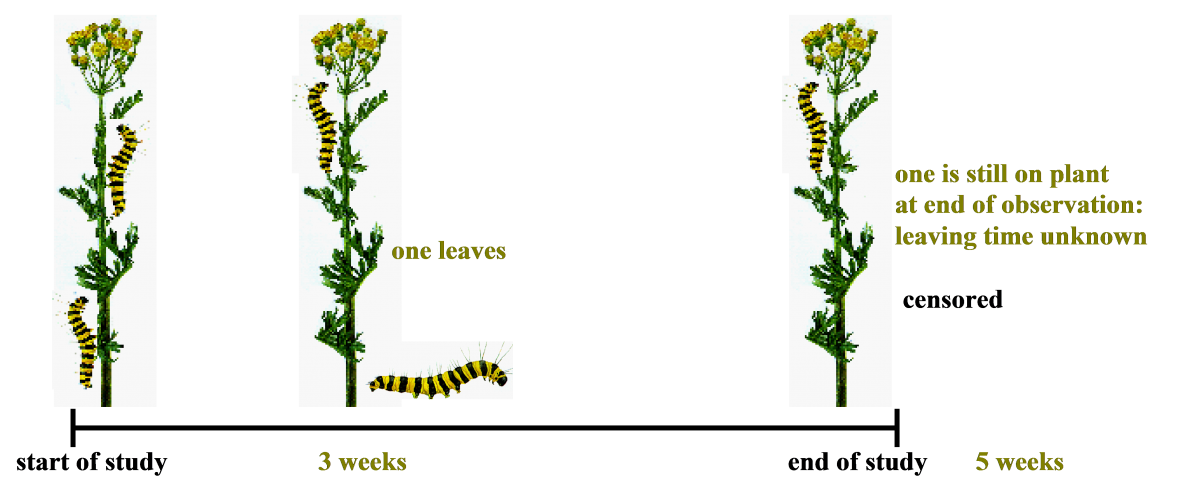Survival Analysis
You are here
Survival Analysis
To be announced
Scope
 Survival analysis was originally developed in medical statistics, to analyse the effects of covariates on survival times (hence its name). The purpose of such analyses is for instance to find out whether certain treatments reduce the incidence of death. The methods are especially designed to take so-called “censored data” into account, when death occurs due to other causes than the studied disease or patients survive until the end of the study.
Survival analysis was originally developed in medical statistics, to analyse the effects of covariates on survival times (hence its name). The purpose of such analyses is for instance to find out whether certain treatments reduce the incidence of death. The methods are especially designed to take so-called “censored data” into account, when death occurs due to other causes than the studied disease or patients survive until the end of the study.
Techniques from survival analysis can be applied in a variety of biological contexts, whenever data consist of time until occurrence of a certain event. Examples are many types of behavioural data, times until recapture, and latency data. In the figure below we give an example on migration of caterpillars. At the start of the observation, there are two caterpillars present on a plant. Their migration times can be studied with survival analysis. In the example, one of the two caterpillars leaves during the observation period. This corresponds to an observed “failure” time. The other caterpillar stays on the plant during the whole observation period. This results in a so-called “censored” observation: the time at which this individual leaves the plant is longer than 5 weeks after the start of the observation. Note that we cannot simply disregard this observation, since it contains information about the caterpillar’s migration tendency. Using survival analysis, this information is taken into account in a statistically correct way.
The course consists of one full day during which we will introduce the concept of survival analysis and show how to apply the methods to biological data. Main subjects are how to handle censored data, estimation of Kaplan-Meier survivor curves, the Log-Rank test for testing differences between survival times, and Cox' regression model for estimating and testing effects of covariates. Lectures will be alternated with time for practice, where participants apply the methods with either SAS or R.
We advise participants to buy the book “Survival Analysis: A Self-Learning Text, Third Edition (Statistics for Biology and Health) (2012)" by David G. Kleinbaum and Mitchel Klein.
Note: as this is a Springer book, people with full access to the Wageningen UR library can download the e-version of this book for free (http://link.springer.com/book/10.1007%2F978-1-4419-6646-9). For all others, the price for a hardcopy version is approximately € 95,-, and € 75,- for the e-book. Please make sure you have the (e-)book in hand before the course starts.
Programme
Day 1
- Introduction to survival analysis
- Survivor functions: estimation and tests
- Cox’ regression model with one or more covariates
- Proportionality assumption and stratification
- An overview of possible extensions
- Computer practical
Day 2
- Presentation of plan of analysis by participants (5 minutes each)
- Working on projects
- Results of the analysis of projects of participants
- Course evaluation
General information
| Target Group | The course is aimed at PhD candidates and other academics |
| Group Size | Min. 14, max. 24 participants |
| Course duration | 2 days |
| Language of instruction | English |
| Frequency of recurrence | Once every three years |
| Number of credits | 0.6 ECTS |
| Lecturers | Dr. Lia Hemerik (Biometris, Wageningen University) and Prof.Dr. Hendriek Boshuizen (RIVM / Division of Human Nutrition, Wageningen University) |
| Prior knowledge | Basic statistical knowledge is required. Participants are advised to prepare by going through the first two chapters of the book by Kleinbaum and Klein. |
| Location | Wageningen University Campus |
| Options for accommodation | Accommodation is not included in the fee of the course, but there are several possibilities in Wageningen. For information on B&B's and hotels in Wageningen please visit proefwageningen.nl. Another option is Short Stay Wageningen. Furthermore Airbnb offers several rooms in the area. Finally, there is also a very active public Facebook group called “Wageningen Student Plaza”, where rooms are often offered for short-term sublets, but where one could also easily post a request for renting a room for a week in Wageningen. Finally, note that besides the restaurants in Wageningen, there are also options to have dinner at Wageningen Campus. |
Fees 1
Generally, the following fees apply for this course, but note that the actual fees may be somewhat different for the next edition of this course.
| PE&RC 2 / WIMEK PhD candidates with an approved TSP | € 150,- |
| All other PhD candidates, postdocs and other academic staff | € 300,- |
| Participants from the private sector | € 600,- |
1 The course fee includes a reader, coffee/tea, and lunches. It does not include accommodation.
2 Those defending their thesis at Wageningen University and those that are a member of IBED Amsterdam or VU Amsterdam
More information
Dr. Claudius van de Vijver (PE&RC)
Phone: +31 (0) 317 485116
Email: claudius.vandevijver@wur.nl
Dr. Lennart Suselbeek (PE&RC)
Phone: +31 (0) 317 485426
Email: lennart.suselbeek@wur.nl
Registration
At this moment, this course is not scheduled yet. However, if you register your interest in this activity below, we will inform you as soon as the course is scheduled and registration of participation is opened.
